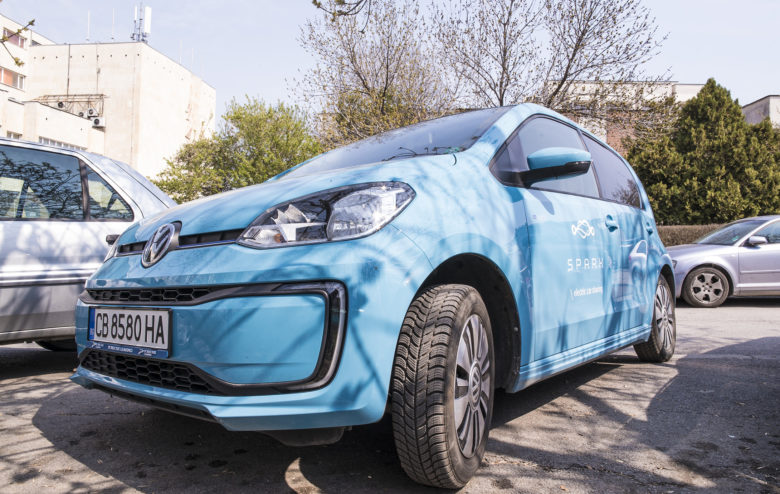E-Car Sharing Service Spark Continues to Grow in Sofia and will Enter Romania by Mid 2019

Spark, the first car-sharing service in Bulgaria and the only in Europe that has a 100% e-vehicles fleet, continues to grow – both in Bulgaria, but also regionally. This year the company plans to double its fleet to 300 vehicles in Sofia, to enter the Romanian market, Bucharest in particular in the next three months, and probably launch services in one more country.
Alongside with the development of Spark, Eldrive, another company part of the group EMobility International, continues to set more charging stations in Sofia and across the country, so the shared service has a suitable infrastructure to grow further. Spark is not planning to launch the service in other cities in Bulgaria in the short term but makes sure customers who rent their cars in Sofia could travel to further destinations.
“We already see a trend among our customers. Especially, after the launch of the latest model – they tend to travel across the country – to Plovdiv, or to the seaside,” tells us Stefan Spasov, CEO of Spark.
New models and sizes
In March, Spark introduced a new type vehicle – the mini SUV model Hyundai Kona 40 with a mileage of up to 300 kilometers per charging. This is the seventh model in the fleet, and so far, 20 cars have been added to the fleet. Another 150 are yet to be delivered.
Spark’s fleet consists of four models small urban cars, one minivan, one cargo, and the latest SUV. Most of the models are products of Nissan, the most basic model is the VM Leaf, and the newest offer is from Hyundai. “We’ll add new models in the near future but we still haven’t decided on the models. When deciding on a new model to expand the portfolio, we always chose cars that could be serviced locally, and belong to the middle to the upper-class category,” explains Spasov. “In other words, there won’t be a Tesla in the fleet,” he adds laughingly.
Still not in the whole city of Sofia
It’s still not possible to park and leave Spark wherever in Sofia. There аre particular zones for this (they have doubled in the past year), otherwise, the client cannot log out and is charged for the time the car is parked on a wrong spot. The reasons – infrastructure development.
The affordable price of the service is one of the USPs of the company (between €0.17 and €0.25 per minute). According to Spasov, this price is directly related to the existing infrastructure for charging. Therefore, the company has still not managed to cover the whole territory of Sofia city. “We will continue to expand from the center to the periphery, but I’d rather not say when it’s realistic to cover Sofia. Our effort is to keep the prices affordable and this is related to the infrastructure. In some parts of Sofia it’s currently hard to build the needed infrastructure,” explains Spasov.
More Charging stations
In the meantime, Eldrive tries to develop the charging infrastructure, so that Spark’s network could cover whole Sofia. At the beginning of 2018, the zone where Spark cars could be parked and left was only in the green and blue parking zones around the city center. The area has already grown double, and we hope to be able to cover the whole city soon.
The company couldn’t reach its previous year’s expectations to have 300 charging stations in Bulgaria by the end of 2018. There are now 120 of them, and the company continues to set new ones on Shell gasoline stations. The partnership with Shell includes 16 charging stations on different locations in Bulgaria.
The Romanian Connection
Spark’s parent EMobility International has been on the Romanian market for over a year now. Last February, through Eldrive it partnered with UBER Green, Uber’s line for e-mobility in Bucharest. Eldrive is the e-vehicles delivery partner and it is also setting charging stations in Bucharest and other large cities in the county.
Spark also sticks to its plan to enter the Romanian market. “If everything goes as planned we will launch the service by mid-2019,” Stefan Spasov, CEO of Spark, told Trending Topics. The service will be first launched in the capital city Bucharest.
Further in the Region
In 2019, Spark will most probably launch on one more market in the region. The strategy of the company is to cover large cities with a population of at least 1.5 million people. Expanding to smaller cities in the countries is not in the plan, at least not in the next three to four years.
Even though Spasov’s first milestones are within the Southeastern European and Baltic market, Western Europe is also part of the roadmap. Being a mass and low-cost service is the competitive advantage of the company. “Our competitive advantage is the aggressive approach we undertake in setting the price levels. We develop everything in-house and that allows us to optimize and operate with low margins. We are targeting the mass market and I would say our prices are around 50% lower than many of the leading companies in this sector in EU”, explained Spasov in an earlier conversation with us.




























